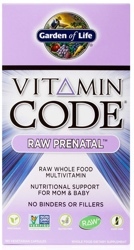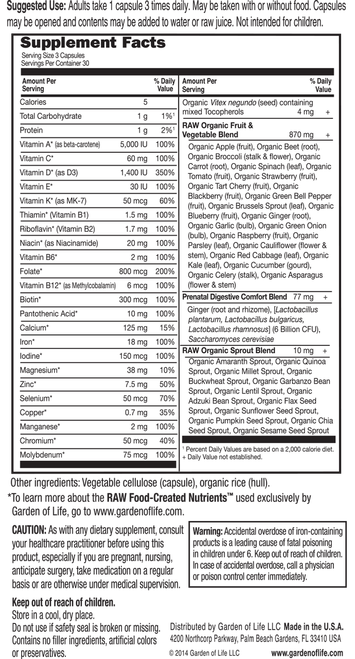Garden of Life Vitamin Code Raw Prenatal 180 Capsules
Vitamin Code Raw Prenatal, A daily prenatal multivitamin supplement is extremely important because it can serve as some dietary insurance, guaranteeing that both the baby and mother wont be cheated if the nutritional targets are not reached through diet alone.

|
See Sale Discount on CheckOut Page Vitamin Code Raw Prenatal 180 Capsules |
|
| Retail Price | $71.99 |
| Discount 30% | $21.60 |
| Your Price | $50.39 |
| More Info | |
More Garden of Life Products
Garden of Life Vitamin Code Raw Prenatal
Vegan and Gluten Free
- Supports the immune system of your unborn child
- Supports the immune system of Mom and her newborn baby
- Supports healthy digestion and elimination with Probiotics, Ginger, Vitamin D, and Zinc
- Provides Ginger traditionally used to ease the common digestive discomforts typically associated with pregnancy
- During pregnancy, blood volume can increase up to 50%, increasing iron requirements and causing the heart to work harder to support the developing childs needs. Vitamin Code RAW Prenatal Formula supports heart and blood health with Iron, Vitamins C, E, and B-Complex, plus Folic Acid
- Provides 800mcg of Folic Acid. The CDC recommends at least 400mcg in support of healthy neural tube development before conception through at least the first trimester of pregnancy
- Supports skin health with Vitamins A and C, Copper and Iron
1. Why is a prenatal multivitamin important?
A: A daily prenatal multivitamin supplement is extremely important because it can serve as some dietary insurance, guaranteeing that both the baby and mother wont be cheated if the nutritional targets are not reached through diet alone. Of course, even the best multivitamin can NOT take place of a good prenatal diet rich in fresh foods, but it is very helpful since it is difficult to get a nutritionally perfect diet every day, especially early in pregnancy when morning sickness, nausea and food aversion are common. It is also important to help reduce the risk of certain birth abnormalities, such as neural tube defects.2. What is VITMIN CODE RAW Prenatal?
A: VITMIN CODE RAW Prenatal is a multivitamin and mineral supplement that is formulated to address two elements of maternal and fetal health: it contains vitamins and minerals to reduce the risk of birth defects and congenital abnormalities typically associated with vitamin deficiencies, and it contains the probiotic organism Lactobacillus rhamnosus to support the immune system of both mother and baby. RAW Prenatal provides a comprehensive panel of nutrients needed to support a healthy pregnancy, including RAW Food-Created Nutrients, for targeted delivery of essential vitamins and minerals to support the babys healthy development and the mothers extraordinary health.3. What are RAW Food-Created Nutrients?
A: The RAW Food-Created Nutrients in Vitamin Code formulas are individually cultivated with their unique Code Factors intact, enabling targeted delivery and natural recognition of nutrients by the body. Imagine growing a plant in the garden, and adding extra vitamin A to the soil to yield a plant rich in vitamin A. The yeast or bacteria is cultivated in water and fed a vitamin to yield a food-based yeast or probiotic matrix that is rich in that particular vitamin. Raw Food-Created Nutrients are grown in both S. cerevisiae (bakers yeast) and the probiotic Lactobacillus bulgaricus to provide a broader spectrum of Code Factors.4. Who can benefit form taking RAW Prenatal?
A: Most people think that a prenatal supplement is exclusively formulated for pregnant women. Healthy nutrient intake is vital prior, during, and after child birth. Because pregnant and lactating women are constantly feeding their child from their body's own nutrients, a plentiful and regular supply of vitamins and minerals is essential. Vitamin Code RAW Prenatal formula is specifically designed to meet the unique needs of women during preconception, pregnancy and lactation.5. Why is RAW Prenatal suggested before pregnancy?
A: Whether a woman is planning to get pregnant or not, she may not be aware of her condition for at least 2 to 3 weeks after conception; women who have irregular periods may even take longer to suspect they are pregnant. Proper folic acid supplementation is suggested at least two months before conceiving. Studies show that adequate intake of this vitamin before conception and early pregnancy can dramatically reduce the risk of neural tube defects in the developing infant.6. Why is RAW Prenatal suggested while nursing?
A: It is important to continue the usage of a prenatal multivitamin during lactation. Breast feeding can take a physical toll on a womans body. Milk production does require a great deal of the body's energy and resources. Breast-feeding mothers burn almost 500 additional calories daily (equivalent to running about four to five miles a day). Most importantly, babies that are exclusively breastfed rely solely on their mothers breast milk for nutrition.7. Is there a particular RDI (Recommended Daily Intake) for pregnancy?
A: There are no standards set by the FDA, the American College of Obstetricians and Gynecologists, or the National Academy of Sciences specifying exactly what must be in a Prenatal Supplement, however some studies indicate that higher amounts of folic acid are needed to prevent neural tube defects. Other nutrients that play a critical role in pregnancy are iron, vitamin B12, calcium and vitamin D for calcium absorption.8. Why is folic acid so important before and during pregnancy?
A: Folic acid is a B vitamin used to make new cells, including those that will form the brain,
spine, organs, skin and bones of a baby. Getting enough folic acid is critical both before and
during pregnancy to help assure proper growth and to prevent birth defects. The FDA
recommends that women of childbearing age consume at least 400mcg of folic acid daily to
help prevent neural tube defects in children should they become pregnant. Some studies
indicate that higher amounts of folic acid are needed for some women to achieve optimal
blood levels. RAW Prenatal includes 800mcg (200% DV) of RAW Food-Created folic
acid.
9. What role does iron play during pregnancy?
A: Iron is needed more during the 9 months of pregnancy than any other time in a womans
life. Blood volume increases up to 50 percent in pregnancy therefore greater amounts of iron
are required. It is essential for the developing blood supply of the fetus and for the mothers
expanding blood supply and placenta, as well as the formation of healthy red blood cells.
Iron will be also stored by the fetus for use during the first six months of life. High levels of
iron in supplements can upset the gastrointestinal tract, leading to constipation, which is
already a problem for many pregnant women. RAW Prenatal includes 18mg (100% DV) of
RAW Food-Chelated Iron, which is mykinder on the digestive system and less likely to lead to
problems such as constipation.
10. What are RAW Food-Chelated Minerals?
A: Chelation is a naturally occurring process in the body for transporting minerals across the
intestinal wall during digestion. Common inorganic forms of trace minerals may interact with
lipids, proteins, fiber or other minerals, inhibiting absorption. When minerals are bound to
chelating agents such as amino acids, they become more stable and are much less reactive
in the digestive tract. RAW Food-Chelated Minerals are minerals that have been bound to
raw rice amino acids making their structure more akin to food, designed to enhance mineral
absorption and improve bioavailability.
11. Why does RAW Prenatal include ginger?
A: RAW Prenatal provides ginger, which has been traditionally used to ease the common
digestive discomforts typically associated with pregnancy, such as morning sickness.
9. What role does iron play during pregnancy?
A: Iron is needed more during the 9 months of pregnancy than any other time in a womans life. Blood volume increases up to 50 percent in pregnancy therefore greater amounts of iron are required. It is essential for the developing blood supply of the fetus and for the mothers expanding blood supply and placenta, as well as the formation of healthy red blood cells. Iron will be also stored by the fetus for use during the first six months of life. High levels of iron in supplements can upset the gastrointestinal tract, leading to constipation, which is already a problem for many pregnant women. RAW Prenatal includes 18mg (100% DV) of RAW Food-Chelated Iron, which is mykinder on the digestive system and less likely to lead to problems such as constipation.10. What are RAW Food-Chelated Minerals?
A: Chelation is a naturally occurring process in the body for transporting minerals across the intestinal wall during digestion. Common inorganic forms of trace minerals may interact with lipids, proteins, fiber or other minerals, inhibiting absorption. When minerals are bound to chelating agents such as amino acids, they become more stable and are much less reactive in the digestive tract. RAW Food-Chelated Minerals are minerals that have been bound to raw rice amino acids making their structure more akin to food, designed to enhance mineral absorption and improve bioavailability.11. Why does RAW Prenatal include ginger?
A: RAW Prenatal provides ginger, which has been traditionally used to ease the common digestive discomforts typically associated with pregnancy, such as morning sickness.|
Garden Of Life On Sale |
 |
|
Vitamin Code Men 240 Capsules |
| $ |
| More Info |
| MegaFood |
 |
|
One Daily 180 Tablets |
| $ |
| More Info |
| Garden of Life |
 |
|
MyKind Organics Mens 40 Plus Multi 60 Tablets |
| $ |
| More Info |
|
Garden of Life On Sale |
 |
|
Vitamin Code Kids 60 Bears |
| $ |
| More Info |
† Statements on this website have not been evaluated by the Food and Drug Administration. These products are not intended to diagnose, treat, cure, or prevent any disease, but rather are dietary supplements intended solely for nutritional use.

